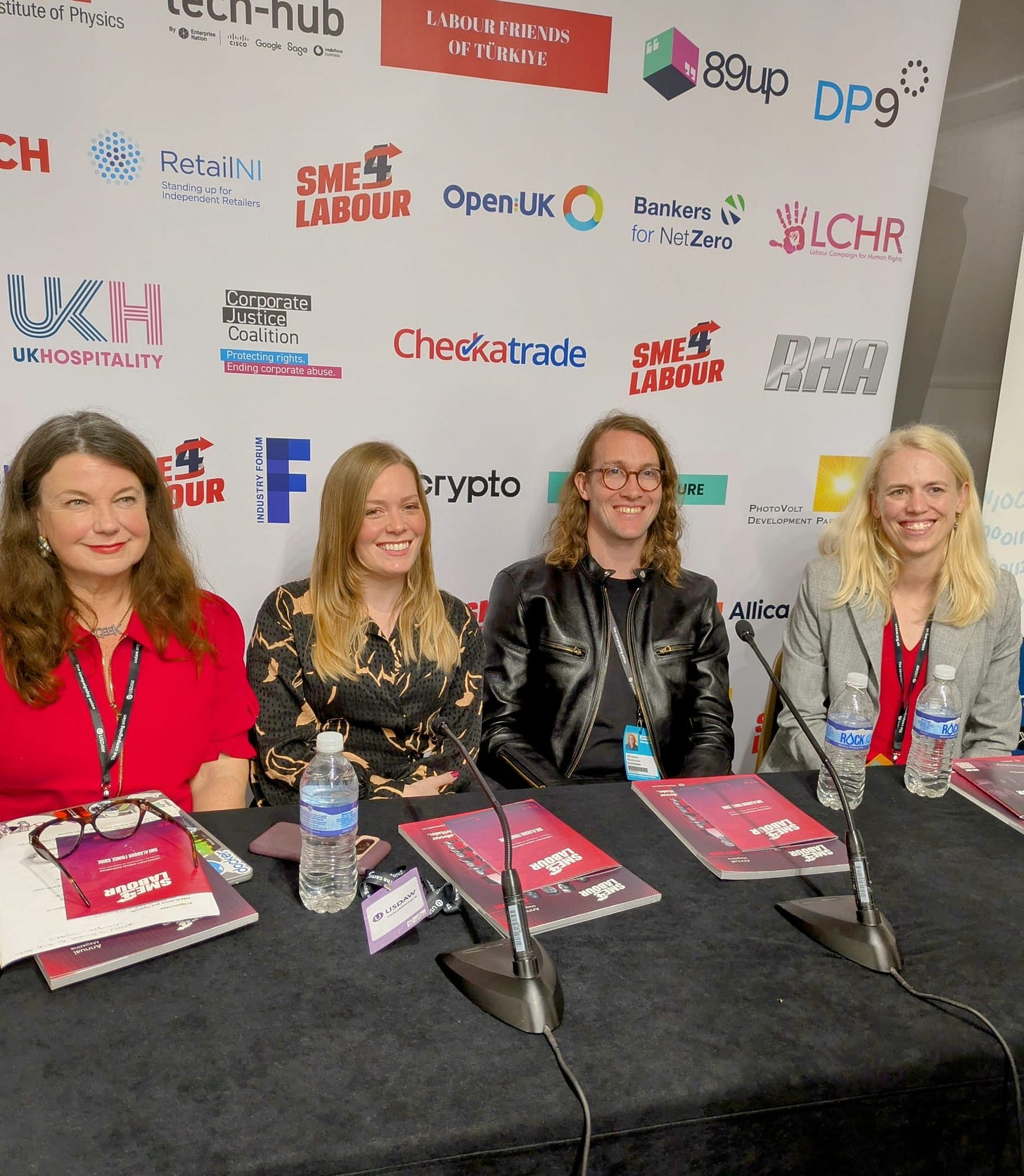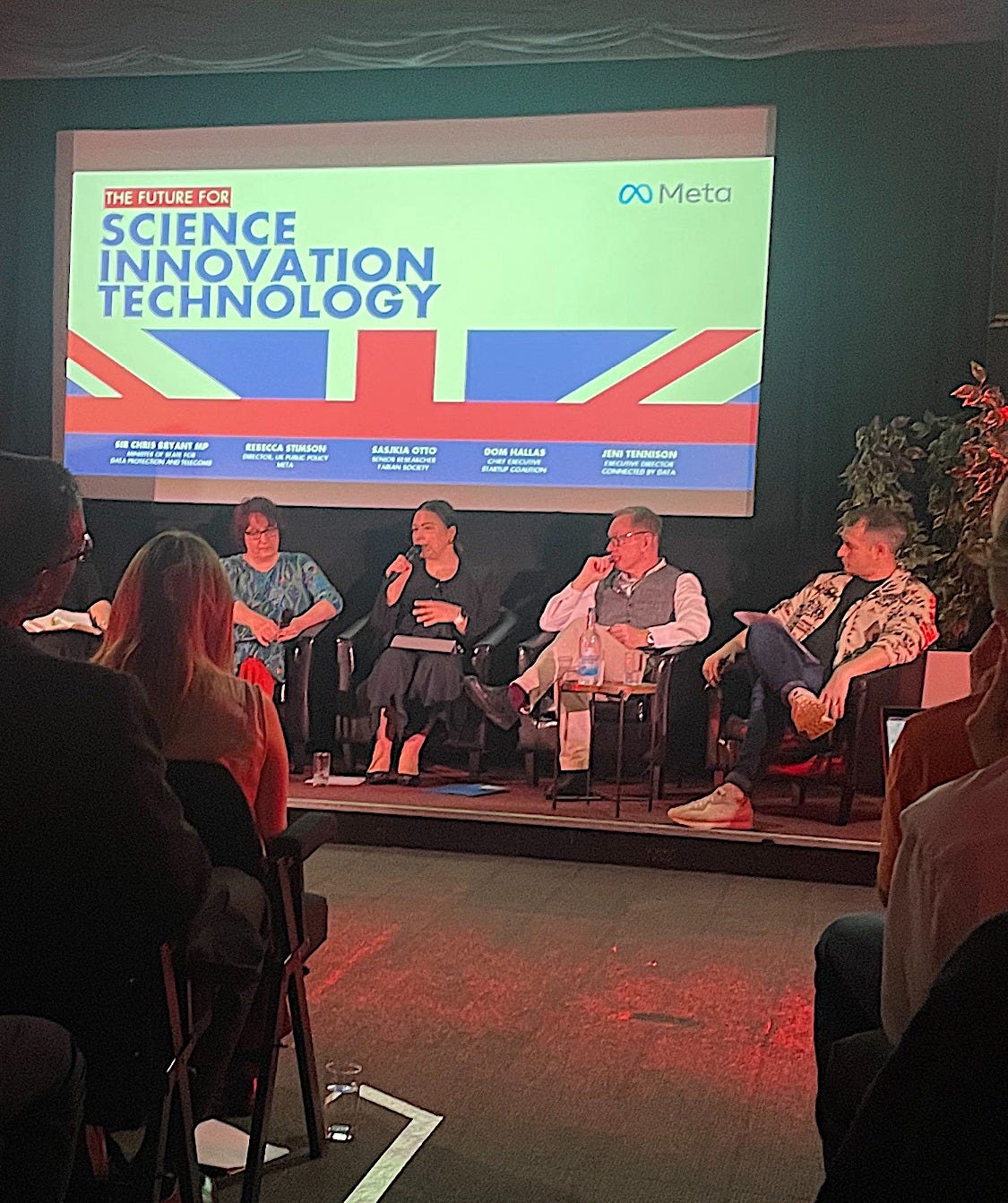Five takeaways from the Labour Party conference
Macrocosmos co-founder Will Squires sat on a panel at the governing party's annual conference - here's what we learned about the current state of AI maturity in the UK's public sector...

Last week, the UK’s Labour Party held its first conference in government for 14 years - and Macrocosmos joined Members of Parliament for a panel discussing how AI can help small medium enterprises. The full discussion will be published in the next couple of weeks.
Beyond the panel, we participated in various forums, debates, and speeches, in order to learn: how does Britain’s newest government feel about AI? What is the current level of maturity? And what are the obstacles to investing in AI more broadly?
These are our five key takeaways from the Labour Conference 2024.
1) Progress hasn’t reduced AI skepticism - it’s increased it.
Around the Labour Party conference, there was an acceptance that AI was both necessary and inevitable. Yet there was also skepticism: not in spite of improvement in machine learning models, but because of it.
The more powerful AI becomes, the greater the need for mechanisms capable of holding these models - and their makers - accountable. Jeni Tennison, Executive Director of Connected by Data, seemed to speak for the majority when she said: ‘Transparency is crucial for an effective accountability mechanism.’

2) Maturity is lower than you think. And sometimes even lower than that.
‘I don’t know very much about that - but I am interested,’ said one Member of Parliament, when asked about AI. Machine learning and AI are used interchangeably. Parameters and benchmarks were almost unheard of.
Politicians are sensitive to the concerns of their constituents. Most people only interact with the ‘black box’ product at the end of the training process, and even they are in the minority. So for the majority, AI is a looming threat that assumes the shape of previous technological risks: shadowy companies brainwashing people through addictive apps or misleading information, impoverishing traditional industries and decimating jobs while amassing vast fortunes for themselves.
This, for most people, is AI. This is what politicians sense from their constituents. It’s easy to forget, when working in the tech sector, that the broader level of maturity is much lower than what we’re used to. And because AI is moving so fast, we risk leaving people behind unless we learn to translate the latest developments into a language that non-specialists can understand.
3) And yet anti-centralization was strong.
Even when people don’t fully understand the technical aspects, they know when they’re being exploited. And nowhere was this sense of exploitation stronger than in the relationship with the social media giants. One delegate, from a trade body representing the traditional press, described social media’s relationship to newspapers simply as: ‘They’re fucking us.’
No one at the Labour Conference seemed to think that Web 2.0 and its proprietary walled gardens had been a success. Whenever it was mentioned, it was used as an example of something to avoid rather than replicate. There was an implicit assumption that the social media model - secretive algorithms, closed source, proprietary tech monopolies - had failed society.
4) The demand for real-world applicability is growing.
Hype is over. There was an impatient ‘Yes, but…’ tone to conversations around cool AI applications. Sure, LLMs are more intelligent than your average attorney. Their image generation is difficult to tell apart from real photography.
Yet breakthroughs in AI were associated with negative real world impact rather than positive ones. There was a sense of disappointment after so much excitement following the emergence of ChatGPT 3 in November 2022.
However, there was a sense of hope. ‘Open banking worked well because it challenged the incumbents to change,’ said Dom Hallas, the CEO of Startup Coalition. If ‘closed’ sectors can be opened up to AI innovation, increased competition could benefit society as a whole.
5) But the basics aren’t good enough - yet.
The main cause of apathy around AI wasn’t to do with ignorance or anti-tech sentiment. It was due to a recognition that, for much of Britain’s public sector, the digital revolution has barely begun.
Wes Streeting, the new Secretary of State for Health, said it frankly in his keynote speech about the NHS: ‘Staff are still spending 12 minutes logging in every morning.’ Sir Chris Bryant, Minister of State at the Department for Science, Innovation and Technology, pointed out the perilous state of the underlying infrastructure on which innovation depends: ‘Copper lines to people’s homes are deteriorating, which means telecare devices won’t work anymore…and we’re still relying on 2G for smart meters, which are not capable of actually serving people’s needs.’
Until we improve the basics - hardware, internet speeds, data governance - talk about applying AI to improve public sector services is premature. To leap forward, we need solid foundations.






